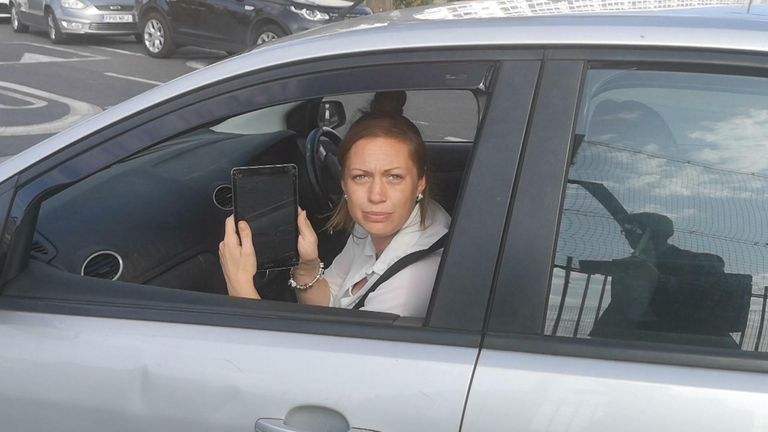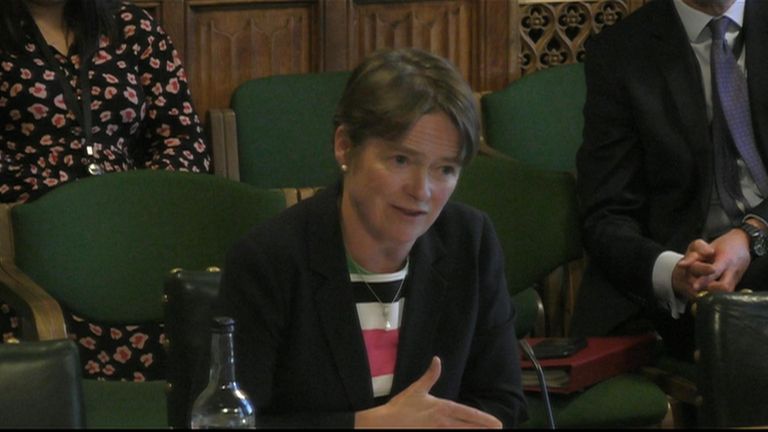Boris Johnson has said he does not want to put the country in another national lockdown but warned the government may need to “intensify things to help bring the rate of infections down”.
He added: “We’re now seeing a second wave coming… clearly we are going to keep everything under review.
“As the disease progresses of course we’re going to have to take further measures.”
With COVID-19 cases now doubling every seven to eight days, the government is looking at introducing nationwide restrictions for a short period to try to “short-circuit” the virus and slow the spread of the disease.
Live coverage of the latest coronavirus news and updates
Government figures stressed the plans being drawn up stopped short of a full national lockdown, as seen in the spring, when the country was told to “stay at home”.
Proposals being worked up for such a “circuit break” could see essential travel to schools and workplaces continuing, but restaurants and bars would shut – or perhaps run on restricted hours – and different households would be asked not to mix.
The restrictions could be put in place for two weeks, but the timing and duration of the measures has yet to be finalised.
Meanwhile, Labour leader Sir Keir Starmer called on the prime minister to hold a COBRA meeting.
“He now needs to take swift and decisive action at a national level to deal with this – he can’t afford to be slow.
“If the prime minister was to take action, the Labour party will support it ad do what we can.”
It comes amid fears that daily coronavirus case numbers could, in a few weeks, hit the figures seen in March and April if the government doesn’t take decisive action now and “hammer down” on the disease.
Professor Chris Whitty, England’s chief medical officer and Sir Patrick Vallance, the government’s chief scientific adviser, warned the prime minister at a meeting on Wednesday evening that the disease was now doubling every seven to eight days.
It is understood they warned the UK is now about six weeks behind France and Spain and in danger of seeing a substantial increase in the number of cases by mid-October if the virus is left unchecked.
Matt Hancock, the health secretary, on Friday told Sky News that a national lockdown was the “last line of defence”.
Downing Street is reluctant to have to return such draconian measures, acutely aware of the damage it would do the economy and to public health in the longer term.
“The PM is in a very difficult situation because it all rests on him,” one senior minister said this week.
“The instinct of the PM is that he has to keep this virus under control, because if there is a spike, it falls on his shoulders. I do feel for him.”
The prime minister also met with Chancellor Rishi Sunak and Business Secretary Alok Sharma on Thursday morning to discuss the economic situation, amid anxiety in government over the looming spike in unemployment when the furlough scheme winds up in October.
The Treasury, along with many of Mr Johnson’s backbenchers and others in his Cabinet, is of the view that the country cannot go back to a full lockdown and must exhaust all other options in order to avoid such a situation.
Coronavirus cases are rising across the UK with a further 3,395 confirmed infections and 21 deaths reported on Thursday.
According to the Financial Times, experts on the government’s Scientific Advisory Group for Emergencies (SAGE) and the Scientific Pandemic Influenza Group on Modelling (SPI-M) have suggested a new national lockdown.
This could coincide with the October school half-term in order to limit the impact on children’s education, the newspaper added.
Asked about the Financial Times report, Mr Hancock told Sky News’ Kay Burley: “The last line of defence is full national action and I don’t want to see that but we will do whatever is necessary to keep people safe in a very difficult pandemic.”
He added: “It isn’t something that we ever take off the table but it isn’t something that we want to see either, it is the last line of defence.”
On Thursday, localised restrictions were introduced in northeast England, which means more than 10 million people across the UK are now in some form of local lockdown.
New restrictions covering the whole of Lancashire, with the exception of two thirds of the seaside resort of Blackpool, are expected to be announced on Friday.
Mr Hancock confirmed the government would be “making further announcements” on localised action later in the day.
“We do have to recognise that the number of cases is rising and we do have to act because we know, especially from looking at other countries, that inexorably leads to more hospitalisations and sadly more deaths,” he said.
“And that is what we want to minimise and we want to protect people’s livelihoods at the same time.”
Pressed on how close the UK might be to a second national lockdown, the health secretary replied: “Sometimes we can’t say exactly what the future holds because we’re in a pandemic.
“But I can give this hope, which is that if everybody follows the rule of six, if everyone follows self-isolation if they have tested positive or if they have been in close contact with someone who has tested positive, and if everybody in the local lockdown areas follows the rules near them, then we can control this virus together.
“But only by the country pulling together.”
:: Subscribe to the All Out Politics podcast on Apple Podcasts, Google Podcasts, Spotify, Spreaker
Mr Hancock pointed to the example of Belgium as offering “hope” for the UK, adding: “They had a start of a second spike, quite similar to what we’ve seen over the last few weeks here, and then they took action and then it came down.
“It came down because the country, once again, came together to tackle the virus.
“In Belgium, for example, they introduced the rule of five, we’ve introduced a rule of six.”


